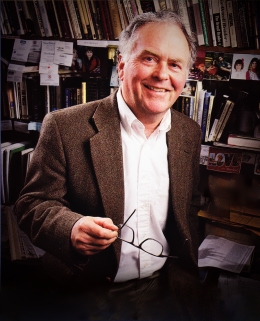 Photo by Ron Jones229 pages, 2015. Interviewed and Edited by Sarah Rabkin
Photo by Ron Jones229 pages, 2015. Interviewed and Edited by Sarah Rabkin
To read the full text [PDF] of Creating a World-Class Graduate Program on a Unique Campus: An Oral History with John Wilkes, Founder of UCSC's Science Communication Program. [University of California escholarship site.]
John Wilkes served from 1981 to 2006 as the founding director of UCSC’s internationally acclaimed Graduate Program in Science Communication, passing the reins upon his retirement to program alumnus Robert Irion. Many of today’s most distinguished science reporters, writers and editors trained under Wilkes, whose literary standards and science-trained student cohort distinguish the program he created from counterparts at other institutions. UCSC’s one-year certificate program has been lauded by New Scientist as the country's best academic training ground for science journalism; it was ranked by Nature as the best such program in all of the US, UK, and Western Europe.
Wilkes’ background as a faculty member is uniquely Santa Cruz-inflected. He lived in town with his family in the 1950s, attending Branciforte Junior High School while his father ran an auto-parts business, until the store’s inventory was ruined by the San Lorenzo River’s infamous flood of 1955. When the Santa Cruz campus opened a decade later, Wilkes enrolled as a transfer student, ultimately completing his BA, MA and PhD in literature at UCSC. After teaching undergraduate science-writing courses at UCSC, he spent two years inaugurating a master’s-level science-writing curriculum at the Massachusetts Institute of Technology. At the invitation of Chancellor Robert Sinsheimer, Wilkes returned to Santa Cruz in 1981, as a Lecturer with Security of Employment, to establish the science communication program.
Wilkes credits UCSC’s “freewheeling liberal arts atmosphere” with the personal, intellectual and professional flourishing of his students, many of whom arrived here from “places where research is way ahead of everything else.” At UCSC, he says, they learned to “relax,” to think more expansively, and to report and write about science with curiosity and enthusiasm.
For more on the achievements of graduates from the Science Communication Program see:
http://scicom.ucsc.edu/students-alumni/alumni_last_name.html

 Santa Cruz, CA
Santa Cruz, CA



